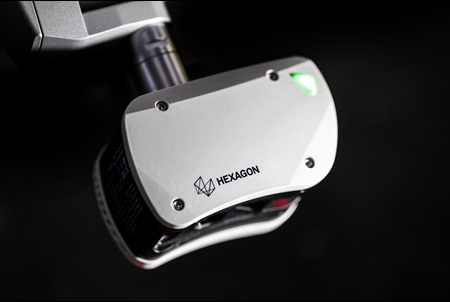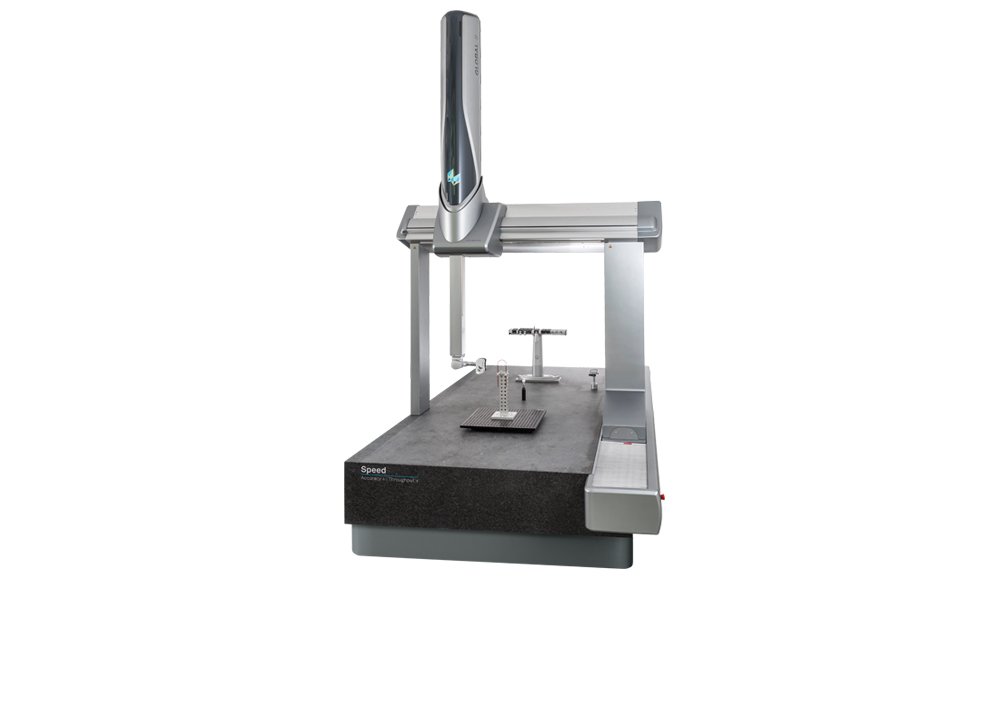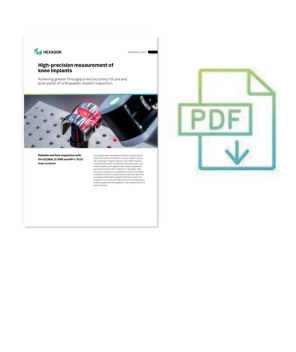High-precision measurement of knee implants
Achieving greater throughput and accuracy for pre and post-polish of orthopaedic implant inspection

The most common materials used in knee prostheses production are metal and plastic. Typically, the polyethylene component acts as a spacer between a metal femoral and a metal tibial component. Depending on the patient’s needs, the plastic component may rotate upon or be fixed to the tibial component.
Accurate dimensioning is critical to the success of the knee replacement and its functionality, so 100% inspection of size and profile both before and after polishing is essential. In the pre-polishing phase, it is crucial to determine that the part is within the correct tolerance so that, in the final machining stage, there is excess material available to allow for polishing without deforming or damaging the part.
The combination of requiring maximal accuracy and 100% inspection makes knee implants a challenging part to measure, particularly for manufacturers working with a substantial batch of thousands of parts per day. Traditionally, manufacturers turned to touch trigger probes to ensure high precision, but this method could risk deforming the part, even when using a low force module.
Joining accuracy and speed in knee implant inspection
Non-contact measurement is the better solution for the required accuracy and speed, so the ideal technology comes in the form of Hexagon’s GLOBAL Speed coordinate measuring machine (CMM) paired with the HP-L-10.10 laser scanner. As well as protecting the part from deformation or damage, HP-L-10.10 enables high quality and high accuracy data to be captured at full-speed on a knee joint’s various surface types and finishes at default exposure settings. This in turn produces further efficiency gains by minimising the need to regularly toggle settings during the measurement process, a familiar cause of time lost to manual interventions when using more traditional solutions. What’s more the scanner offers a range of capabilities that further streamline knee joint inspection workflows.
Firstly, the laser scanner is designed with an overview camera that offers a livestream video of the inspection process. A ‘visual guide’ shown in the video stream indicating the lasers working range allows the quality technician to validate part inspection routines when working remotely from the CMM, while enabling operators to direct the laser line scanner to knee joint areas and features of interest.
 The overview camera also supports streamlined traceability processes, which are crucial to knee prostheses production. The camera captures images of the knee protheses during the inspection routine that can be added to the quality report to demonstrate surface properties and document defects. This enables a streamlined approach to tracking and recording historical information that may be required by different standards agencies (such as the Food and Drug Administration federal agency in the U.S).
The overview camera also supports streamlined traceability processes, which are crucial to knee prostheses production. The camera captures images of the knee protheses during the inspection routine that can be added to the quality report to demonstrate surface properties and document defects. This enables a streamlined approach to tracking and recording historical information that may be required by different standards agencies (such as the Food and Drug Administration federal agency in the U.S).When used with PC-DMIS metrology software, HP-L-10.10 offers additional productivity gain opportunities for knee implant manufacturers. PC-DMIS calculates the fastest and most accurate laser-scanning path by automatically generating the tips, scans, and motions needed for optimal measurement, further reducing cycle times.
The GLOBAL Speed is uniquely characterised by customisable enhancement options that allow manufacturers to combine technologies in a way that is optimised to support their specific objectives. For manufacturers working with sizeable batches of knee joints, the Throughput+ feature is designed to deliver solutions that shorten inspection cycles while maintaining high accuracy. In addition, GLOBAL Speed offers environmental monitoring and enhanced data analysis capabilities to increase user confidence in process control and when working remotely, leaving the CMM to measure knee joints quickly and accurately.



